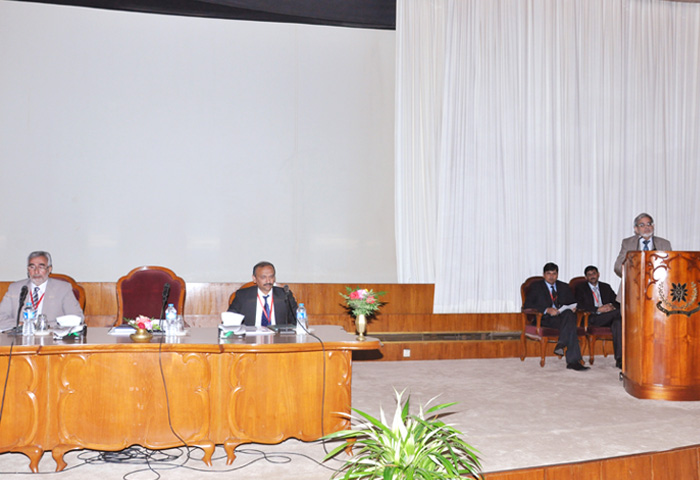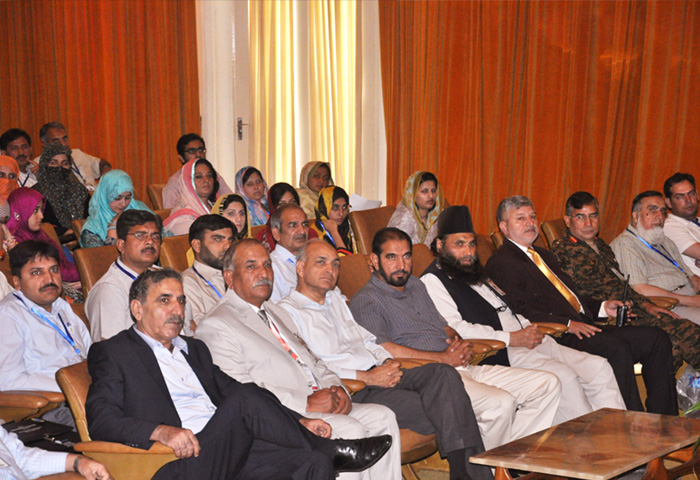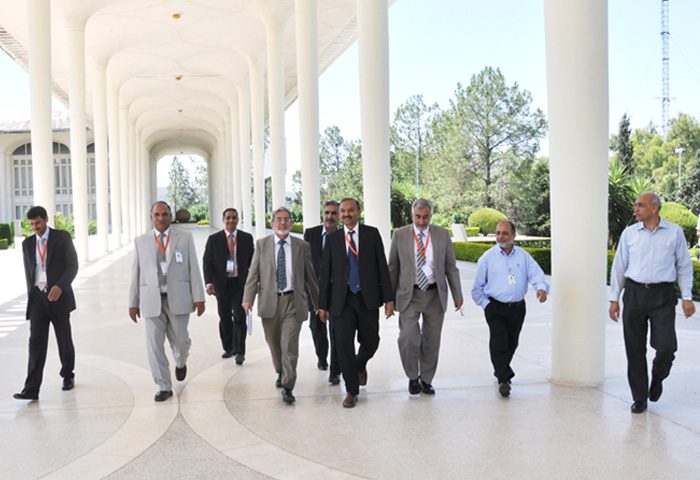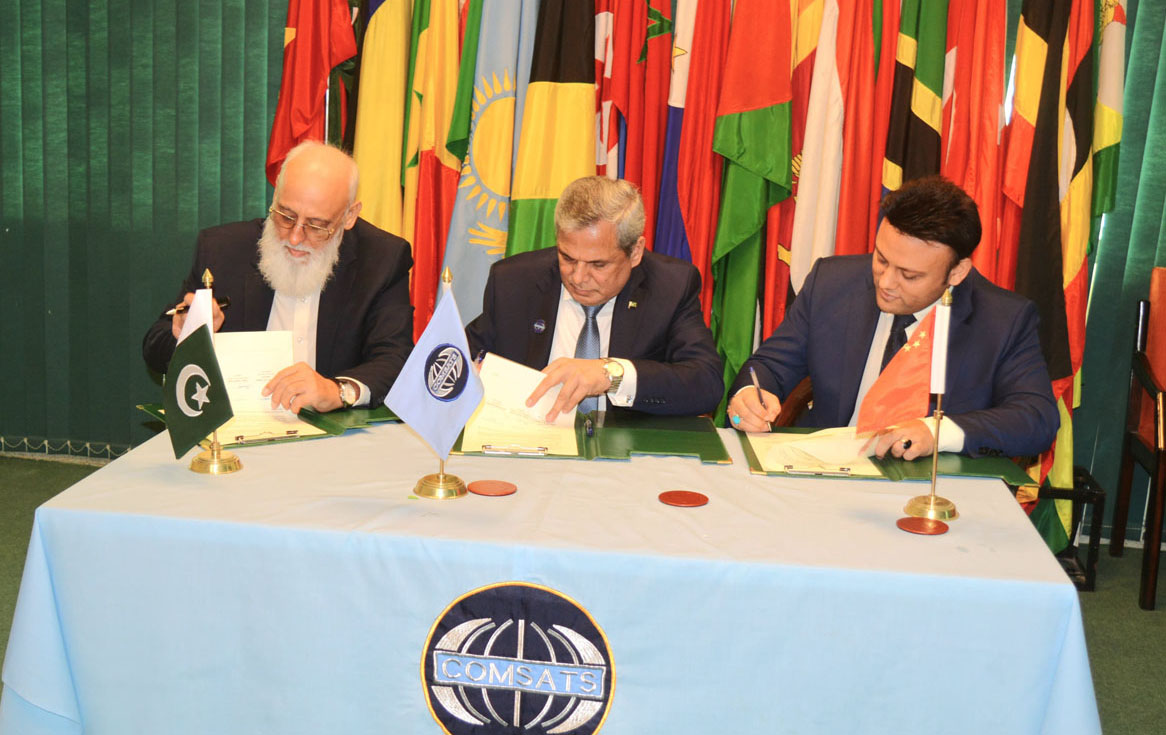On June 3, 2014, Dr. I. E. Qureshi, Executive Director COMSATS, presided over the inaugural function of a three-day Conference on ‘Frontiers of Nanoscience and Nanotechnology’ organized by Pakistan Institute of Nuclear Science & Technology (PINSTECH), Islamabad, Pakistan, from 3rd to 5th June 2014.
The Conference brought together eminent researchers, academi cians and technologists, as well as young researchers from several disciplines, who presented their state-of-the-art research in the areas of nanoscience and nanotechnology. Besides plenary and invited talks by leading experts in the fields, there were oral and poster presentations of research papers. Plenary talks were delivered by experts from Pakistani higher education institutions, including Quaid-i-Azam University; Preston Institute of Nano Science & Technology (PINSAT); COMSATS Institute of Information Technology (CIIT); PINSTECH; Ghulam Ishaq Khan Institute of Engineering Sciences and Technology (GIKI); National University of Sciences and Technology (NUST); Air University; Pakistan Institute of Engineering and Applied Sciences (PIEAS); and National Center of Physics (NCP). The conference covered a number of frontier areas of nanoscience and nanotechnology, broadly categorized as: Nanomaterials Synthesis & Characterization; Modeling, Simulation & Informatics; Polymers, Composites & Alloys; Soft Matter & Colloids; Coatings, Surfaces & Membranes; Electronics, Magnetism & Spintronics; Nanophotonics & Plasmonics; Catalysis & Energy Storage; MEMS, NEMS & Quantum; Devices; Graphene & Graphene oxide; Nanomedicine, Drug Delivery & Diagnostics; and Nanosensors & Actuators.
cians and technologists, as well as young researchers from several disciplines, who presented their state-of-the-art research in the areas of nanoscience and nanotechnology. Besides plenary and invited talks by leading experts in the fields, there were oral and poster presentations of research papers. Plenary talks were delivered by experts from Pakistani higher education institutions, including Quaid-i-Azam University; Preston Institute of Nano Science & Technology (PINSAT); COMSATS Institute of Information Technology (CIIT); PINSTECH; Ghulam Ishaq Khan Institute of Engineering Sciences and Technology (GIKI); National University of Sciences and Technology (NUST); Air University; Pakistan Institute of Engineering and Applied Sciences (PIEAS); and National Center of Physics (NCP). The conference covered a number of frontier areas of nanoscience and nanotechnology, broadly categorized as: Nanomaterials Synthesis & Characterization; Modeling, Simulation & Informatics; Polymers, Composites & Alloys; Soft Matter & Colloids; Coatings, Surfaces & Membranes; Electronics, Magnetism & Spintronics; Nanophotonics & Plasmonics; Catalysis & Energy Storage; MEMS, NEMS & Quantum; Devices; Graphene & Graphene oxide; Nanomedicine, Drug Delivery & Diagnostics; and Nanosensors & Actuators.
Addressing the participants of the Conference, Dr. Qureshi noted that Pakistan is lagging behind in the ongoing global technology revolution based on nanoscience. He appreciated the efforts of the Ministry of Science and Technology, Government of Pakistan, to prepare a comprehensive project for strengthening nanoscience and nanotechnology research at its three subsidiary organizations, Pakistan Council of Scientific and Industrial Research (PCSIR), CIIT, and NUST. He noted that the establishment of a cell within the Ministry to coordinate research activities in the relevant areas through 20 laboratories of different universities and R&D organizations is a welcome step. However, there is a need to launch a National Nanotechnology Initiative, to help prepare the country for the onslaught of nano-applications having market potential of up to US$ 3T by 2015. Dr. Qureshi also informed the participants of the Conference about the role that is being played by COMSATS Headquarters, Islamabad, and CIIT in organizing relevant symposia and workshops recently, where scientists from China, Malaysia, Germany and USA visited Pakistan and shared their experience of research at the cutting edge of nanotechnology.
and Technology, Government of Pakistan, to prepare a comprehensive project for strengthening nanoscience and nanotechnology research at its three subsidiary organizations, Pakistan Council of Scientific and Industrial Research (PCSIR), CIIT, and NUST. He noted that the establishment of a cell within the Ministry to coordinate research activities in the relevant areas through 20 laboratories of different universities and R&D organizations is a welcome step. However, there is a need to launch a National Nanotechnology Initiative, to help prepare the country for the onslaught of nano-applications having market potential of up to US$ 3T by 2015. Dr. Qureshi also informed the participants of the Conference about the role that is being played by COMSATS Headquarters, Islamabad, and CIIT in organizing relevant symposia and workshops recently, where scientists from China, Malaysia, Germany and USA visited Pakistan and shared their experience of research at the cutting edge of nanotechnology.
At the close of the function, Dr. Qureshi presented the Director-General PINSTECH a book on advances in nanotechnology research in different developing countries based on the proceedings of International Workshop on ‘Nanotechnology in the Edge of Convergence’, held in Selangor, Malaysia (November 24-27, 2011), which was edited and published by COMSATS with the support of NAM-S&T Centre, India.







